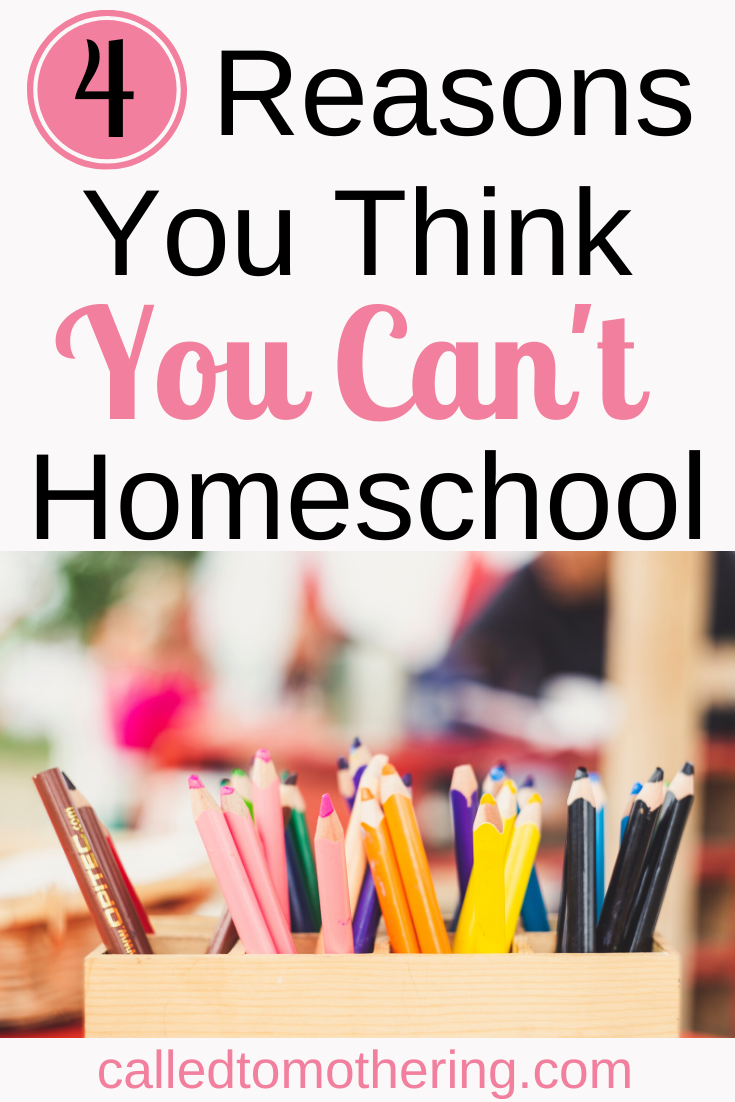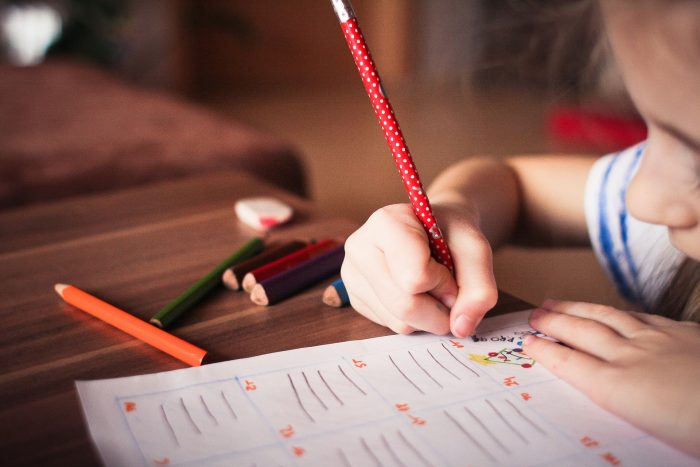Before I started homeschooling, I had all sorts of doubts about my ability to educate my own children. I thought I would single-handedly be responsible for messing up my kids’ future since they would be unprepared for real life.
Even though I had managed to parent two pretty decent small human beings, using only common sense and a whole lot of prayer, I still felt I was unqualified to be their teacher.
There are still plenty of days where I feel I’m not cut out for this. I’ve described myself as an unlikely homeschooler, since it wasn’t my original plan to educate my children at home.
But the truth is, there really is no such thing as an “unlikely homeschooler”. Every one of us has already been given everything we need to teach our own kids. It’s just that we’ve been conditioned to believe the village can meet our children’s needs better than we can.
You are probably convinced, too, that the “professionals” know what the best education practices are and that only true learning takes place inside of a classroom. Here are 4 reasons why you think you can’t homeschool, the same ones I said at one time or another.

1. I’m just not patient enough to teach my kids.
Lest you think I am the patron saint of patience, I assure you that I struggle in this area just as much as anybody. I am guilty of hurrying my children so we can get out the door or move onto the next thing. I get frustrated easily with their bad attitudes and behavior and what I perceive as slowness to complete tasks. I still fail in showing them grace when they make mistakes.
But I will tell you that the work of homeschooling is producing the fruit of patience, gentleness, and kindness in me. I am being stretched by God to do something I don’t have the strength or ability to do on my own. We have all heard that suffering produces endurance (Romans 5:3), and homeschooling is no different.
Being right there with them every step of the way to encourage and teach them is growing in me a patience I never would have had otherwise. I’ve gotten a glimpse of God’s long-suffering nature with His people by sticking with my kids through their problems with reading or math and difficult attitudes, when it’s hard and doesn’t produce the instant results I want.
2. I’m not crafty or creative enough.
I’ve never had a penchant for arts and crafts, especially ones that involve planning and any sort of mess. At the time I began homeschooling three years ago, I didn’t even have a Pinterest account. As we muddled along though, I discovered a creative side I didn’t know I had.
Suddenly I was pinning stuff like crazy onto my boards and even coming up with my own crafts and activities. They weren’t anything elaborate, just simple and low prep.
All of a sudden, I wanted to help my kids produce something that would tie in and fit with their kinesthetic type of learning. A desire to see them really grasp a concept compelled me to seek out those projects that would bring their learning to life.
Yes that meant cleaning up more messes than usual, but it was totally worth it to see how proud they were of what they made. Most of the time, it involved very little planning on my part.
I usually just provided the materials they needed to create, along with an idea. What I found too was that I often had a certain concept in my head, but then they would take it to a whole other level and make something far better than I had envisioned.
3. I would go crazy spending that many hours with my kids all the time.
I feel you on this one. Before homeschooling, I dreaded holiday breaks and summer vacation. I dreamed of the day when both my children were in school full-time so I could have much needed “me time”. When we started, I felt like the door was slamming shut on a future I had all planned out.
But I realized God’s plans are better than mine. My need to have a break from them actually lessened the more time we spent together. As with patience, my fondness for them has only grown.
I have come to appreciate my kids so much more because I have witnessed firsthand their creativity, problem solving, and kindness towards each other daily. We have made special memories together through all of the learning that takes place in our home. A strained relationship I had with my then six-year-old son has been healed, and it has flourished.
Don’t get me wrong; my kids still drive me batty sometimes and I still need breaks once in a while. However, because we spend so much time with one another, we’re just used to doing life together.
Since my kids are with me practically 24-7, and I know what they’re learning, reading and watching, problems that come up can be dealt with relatively quickly. That disrespectful behavior can’t fly under the radar as easily. My kids have learned how to cooperate with each other because they’re not separated in different classrooms all day long, making for a more pleasant home and school environment.
4. Teachers are more intelligent and better equipped to instruct my kids.
While it’s true that there are some amazing teachers out there who are highly educated or specialized in certain subjects, you have one thing they do not have. You are an expert on your child. You have been studying him or her since he or she was born, observing their habits, quirks, likes, and dislikes.
A teacher has to try and apply what they’ve learned in their field to 20 different children, who all have various different learning styles and personalities. They have to do this without any prior knowledge about a specific child, all while managing a classroom.
You have the distinct advantage of a lower teacher to child ratio, plus the added bonus of years of research into which learning methods are best suited for your son or daughter.
No one knows your child better than you do. You can anticipate their needs before they articulate them. You have already been teaching them, every single day. Who taught them how to eat solids? Who taught them their ABC’s and how to count? Who potty trained them (no small feat, am I right)?
You’ve read books to them, pointing out pictures that go with words. You’ve encouraged them to create works of art using finger paint, water colors, and crayon scribbling.
Without realizing it, you have been teaching them about how the world works simply by your example. You are helping them develop character and independence, how to love and serve others, how to express themselves, and how to see themselves through God’s eyes.
You have been incredibly influential on their development during the most crucial years of that development. Why does your role in their education drastically drop off the day they start Kindergarten?
Homeschooling is just a continuation of that teaching into higher and more difficult types of tasks. You’re most likely not going to be helping them solve algebraic equations or do chemistry experiments on Day 1, anyway. 🙂


Great encouragement and truths for homeschooling families! Thank you for reminding me that God has already equipped us to teach our children!
Great post! Homeschooling is not for the faint of heart, but after 16 years of homeschooling and still growing strong, I believe it is is one of the best decisions that I made for my family. Blessings, Misty
Your posts always speak right to me! Even as a former teacher, I worry about not being a good teacher to my son. Most of my training and experience included teaching through partner and group work, and he will be alone with just me.
And I totally relate to the lack of craftiness! Hearing that God helped you in these areas is so encouraging.
The one I personally struggle with is number 4 for myself. I had such a hard time with school as a kid that I feel like I would be cheating our kids knowledge.
First off, as a certified (former) public school teacher, some of the best teachers that I have seen have been those that struggled with school. They know from their own experience what worked and what didn’t. They can grasp new methods of teaching that would have worked on themselves and so on. A teacher than had it super easy in school themselves is often not empathetic or understanding and just may not have all the tools that you already have in your own pocket because you have been to the university of hard knocks.
You answer these drawbacks wonderfully! Both my husband and I were homeschooled through highschool. He had two years of public education, but I didn’t have any. We both were in agreement before we even had children that this was something that we were going to do, so I hadn’t though of some of these reasons, but I know that for many people who are thinking about taking their littles out of public/private school and bringing them home, these are things that they really wonder about. Thanks so much for answering those wonderings with grace. 🙂